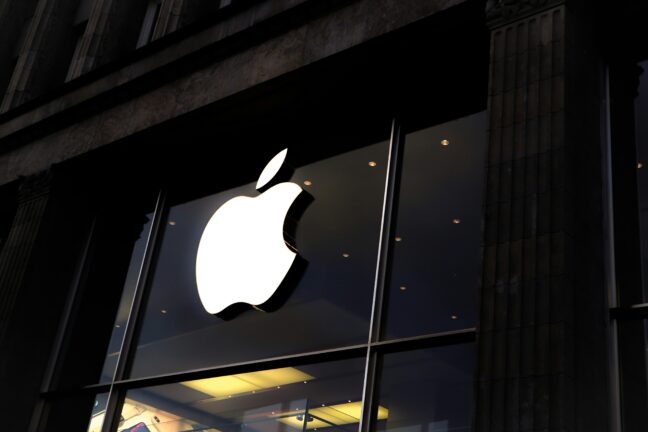Big tech has escalated its criticism of the EU’s Digital Markets Act, urging Brussels to ’reset’ the regulation, which they say is harming European users and businesses. However, European lawmakers have hit back branding the tech giants’ claims as ’unrealistic and dangerous’, and a direct challenge to Europe’s digital sovereignty.
In its submission to the Commission’s consultation for feedback, Apple argued that the Digital Markets Act (DMA) is forcing ’concerning changes’ to how it designs and delivers products in Europe. For the company, this is resulting in ’a worse experience’ for EU users. Apple also argued that the rules have already led to “feature delays” and are exposing consumers to more risks.
Google struck a similar tone. They warned that the DMA is causing ’significant and unintended harm’, citing traffic losses, new security risks on Android, and delays in launching AI tools. Both companies insist the rules, introduced in 2022, undermine innovation and consumer choice rather than boosting competition.
“Unrealistic and dangerous”
However, lawmakers in Brussels reject Silicon Valley’s complaints. Socialist MEP Laura Ballarín Cereza (S&D, ESP) argued that the regulation is central to defending both European citizens and digital sovereignty.
“The Digital Market Act was approved to protect European citizens and to safeguard Europe’s digital sovereignty and competitiveness”, she said, adding that the bloc “must be autonomous and competitive, but not at any price—and certainly not by selling its model, rooted in laws and fair rules, to the interests of American big tech companies”.
You might be interested
If Google, Apple, or any other company wishes to operate within the European Single Market, then they must respect and comply with these rules. — MEP Laura Ballarín Cereza (S&D, ESP)
Furthermore, Ms Ballarín welcomed the Commission’s decision to fine non-compliant platforms, such as Google and Apple, calling it more than a legal sanction, but a political message. “It is about sending a strong political message at a moment of tension with the U.S. administration”, she argued, leaving no doubt about that European rules apply even for the biggest names in tech. “If Google, Apple, or any other company wishes to operate within the European Single Market, then they must respect and comply with these rules”.
MEP Andreas Schwab (EPP, DEU), the Parliament’s lead negotiator on the DMA, struck a similar note. He dismissed Apple and Google’s calls to scrap the law as ’unrealistic and dangerous’, stressing that “Europe will not allow digital corporations to dictate what our rules should look like”.
Europe will not allow digital corporations to dictate what our rules should look like. — MEP Andreas Schwab (EPP, DEU)
While acknowledging that some obligations, such as demands for access to stored Wi-Fi data, raise legitimate privacy concerns, Mr Schwab stressed that Parliament is committed to enforcing the law and prepared to hear Apple’s arguments. “It has long been planned that we will discuss Apple in detail in the DMA working group”, he said. “This will give us the opportunity to comprehensively examine the latest developments with Apple—and to make it clear that the DMA will be consistently implemented in Europe,” added MEP Schwab.
Apple and Google warn of risks and harm to consumers
For Apple, the DMA is not delivering more choice but forcing what it calls ’concerning changes’ to how its products work in Europe. The company says the rules are already leading to ’feature delays’, such as the rollout of Live Translation on AirPods and iPhone mirroring, and creating ’a worse experience’ for EU users.
Moreover, Apple argues that interoperability requirements expose consumers to more risks. This includes riskier app downloads and third-party payments, as well as requests for sensitive data such as notification content and Wi-Fi history. Instead of expanding options, the company warns, the DMA is leaving Europeans with fewer choices, less differentiation, and greater risks. While their devices fall further behind those in the rest of the world.
Google voiced similar concerns, but framed the damage in broader economic terms. The company argues the DMA was producing ’unintended harm’ to users, from raising travel prices by prioritising intermediary booking sites over direct links, to undermining security on Android devices by forcing the removal of safeguards against scams. A study cited by Google estimated the DMA is causing revenue losses of up to €114bn across European sectors.
Brussels backs the Digital Markets Act
The European Commission has dismissed the companies’ claims. “Thanks to the DMA, companies have the right to compete fairly”, said tech spokesperson Thomas Regnier. That stance reflects the Commission’s enforcement priorities and the broader political debate between Europe and U.S. tech giants.
Apple has already taken the fight over the DMA to the EU courts, with a hearing in the Court of Justice of the European Union scheduled for 21 October. At the same time, transatlantic tensions are deepening. President Donald Trump recently threatened retaliatory tariffs after Brussels fined Google €2.95bn for anticompetitive practices.











